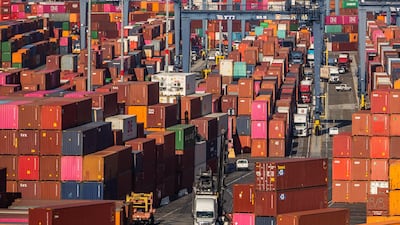While global trade flows have adjusted following the Covid-19 pandemic, establishing more varied supply chains will help soften the impact from future shocks, the International Monetary Fund said.
Further diversification of inputs across countries and making inputs from different countries more replaceable can help build resilient supply chains, the Washington-based fund said in a blog post on Tuesday.
“Disruptions wrought by the pandemic led to calls for more domestic production of goods (reshoring),” the IMF said. Its latest World Economic Outlook reveals that “dismantling global value chains is not the answer — more diversification, not less, improves resilience".
The damage to international trade triggered by Russia's military offensive in Ukraine and the continuing pandemic has increased awareness among governments and companies that they need more resilient supply chains.
The World Trade Organisation projects that the Russia-Ukraine crisis could lower global gross domestic product growth by 0.7 to 1.3 percentage points, bringing growth to between 3.1 per cent and 3.7 per cent for 2022, it said in an April 11 report.
The organisation revised down its forecast for global trade growth this year to 3 per cent from 4.7 per cent earlier owing to the Russia-Ukraine war, it said on Tuesday. Global trade growth in 2023 is expected to be 3.4 per cent.
The IMF's analysis shows that diversifying the supply chain can significantly reduce global economic losses after disruptions.
After a sizeable labour supply contraction of 25 per cent in a single large global supplier, GDP for an average economy “falls by 0.8 per cent” under the baseline. In the high-diversification scenario, this decline is reduced by almost half, it said.
“Most of this benefit accrues to countries other than the source country, as higher diversification makes them less dependent on intermediates produced by the source country. The source country also benefits, as diversification makes it less dependent on domestic sources."
Higher diversification also reduces volatility when several countries are hit by supply shocks.
The fund estimates that the volatility of economic growth in the average country is reduced by about 5 per cent in this scenario.
However, diversification offers little protection when a major disruption hits all economies at the same time, like during the first four months of the pandemic, the IMF said.
With greater substitutability, GDP losses in all countries — other than the source country — are reduced by about four fifths, it found. Substitutability in this case refers to how easy it is for a producer to switch inputs from a supplier in one country with those from another country.
Ensuring equitable access to vaccines and treatments remains the first priority among policies recommended by the IMF.
“Recent targeted lockdowns in China are a reminder that pandemic-related restrictions continue to have an impact far beyond the affected country,” the IMF said.
Improving infrastructure is also critical to mitigate supply disruptions related to trade logistics.
For example, upgrading and modernising port infrastructure on key global shipping routes would help reduce global “chokepoints". Better digital infrastructure to facilitate telework can also help mitigate spillovers to other countries.
Finally, reducing trade costs can help diversify inputs, the IMF said.
Reducing non-tariff barriers would give a significant medium-term economic boost, especially in emerging markets and low-income developing countries, it said.
Lowering trade policy uncertainty and providing an open and stable trade policy regime can support greater diversification, it added.


